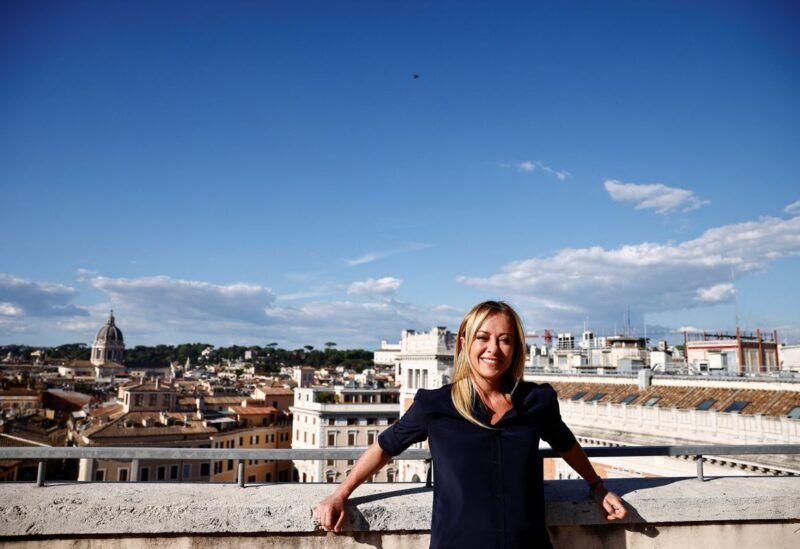
Giorgia Meloni, leader of far-right Fratelli d'Italia party, poses for a picture before an interview with Reuters, in Rome, Italy, August 24, 2022. REUTERS/Yara Nardi
If a rightist alliance wins next month’s election, Italy will seek to curb China’s economic expansion and continue to back Ukraine militarily, according to nationalist leader Giorgia Meloni.
Meloni is expected to lead a conservative group to a landslide victory in the September 25 national election, putting her in pole position to become the country’s next prime minister.
The next government would have to face a rapidly changing international landscape, with both Russia and China challenging the West, Meloni said, adding that under her leadership, Italy would not be “the weak link” in the Western alliance.
“Ukraine … is the tip of the iceberg of a conflict whose objective is the revision of the world order. Russia is louder at present and China is quieter, but its penetration is reaching everywhere,” she said in an interview.
Italy in 2019 was the first major industrialised nation to became part of China’s Belt and Road Initiative – a colossal project designed to improve Beijing’s trade reach.
Little has so far come of the pact, which was signed during a state visit to Italy by Chinese President Xi Jinping, and Meloni said she would not look to pursue it.
“There is no political will on my part to favour Chinese expansion into Italy or Europe,” she said, adding that she was opposed to Europe’s drive to promote electric vehicles, saying the policy would favour China, a major producer of EV batteries.
Although Meloni has consistently backed Ukraine in its conflict with Russia, her main two political allies, League leader Matteo Salvini and Forza Italia head Silvio Berlusconi, have questioned the wisdom of Rome sending arms to Kyiv.
Meloni said she had no intention of ditching current support for Ukraine, saying the cliched image of Italy being a lightweight nation of “spaghetti and mandolins” had to end.
“I want Italy to be strong on the international chess board,” she said, speaking from her parliamentary office overlooking Rome.
Meloni’s Brother of Italy group traces its roots back to a post-fascist party that was created by supporters of World War Two dictator Benito Mussolini.
Her main political opponent, Enrico Letta, the head of the centre-left Democratic Party, said this month that Italy’s nationalistic right posed a threat to European democracy.
A video subsequently emerged of Meloni, as a teenage political activist, praising Mussolini as “a good politician”. Asked about the comment, she said her opinions had changed since the 1990s and she accused Letta of irresponsibly spreading unwarranted fear abroad over her possible election.
“Every time there is an election, the fascist alarm bell is rung. You can see how ridiculous it is when they dig up videos made when I was 15,” she said.
Meloni has compared her party to the Republican Party in the United States and Britain’s Conservative Party. However, she said she had no plans to follow their example in key policy areas, such as the U.S. decision in 2020 to shift its Israeli embassy to Jerusalem, or Britain’s bid to send asylum seekers to Rwanda to discourage them crossing the English Channel.
More than 800,000 migrants have reached Italy since 2011, most of them via boats from north Africa.
Meloni said the best way to halt the arrivals would be to reach a deal with Libya similar to the one struck with Turkey in 2016, whereby the European Union pays Ankara to house refugees and prevent them trying to make it to Europe.
She brushed off concerns over rampant human rights abuses in Libya, saying international organisations could run refugee camps and help identify legitimate asylum seekers who would then be sent to countries across the European Union.
As recently as 2014, Brothers of Italy called for the dismantlement of Europe’s single euro currency. It has since rowed back on this and now endorses Italy’s “full adhesion” to European integration.
However, Meloni said previous governments had been too referential with Brussels and pledged a more robust approach.
“It simply means explaining that the defence of national interests is as important to us as it is to the French and Germans,” she said.